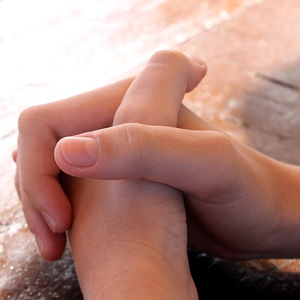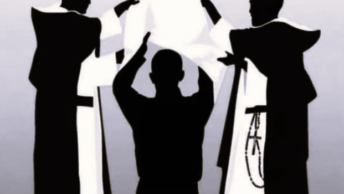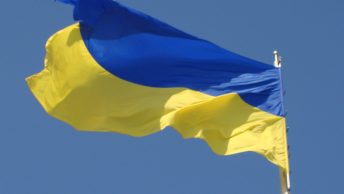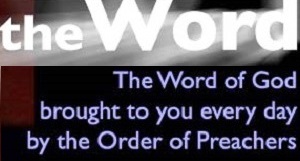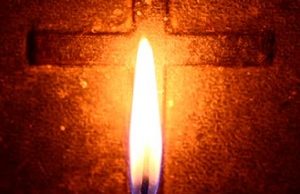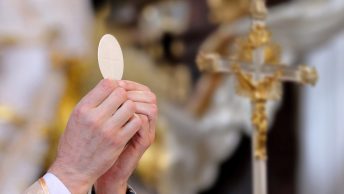Steps leading from searching to the fruit of prayer.
With the Luminous Mysteries of the Rosary.
Introduction
With gratitude to my parents, whom I would like to thank for everything
The Hungarian version was published by the Hungarian Dominican Province in 2003.
Thököly út 56, Budapest, 1146
Prayer in the life of people in the 21st century
I am writing this on the occasion of the European Assembly of Lay Dominican Fraternities scheduled to take place in Walberberg in Germany in 2004. I have chosen prayer as the subject of my presentation, more precisely: ‘The place of prayer in people’s everyday lives in the 21st century, with special regard to the new mysteries of the Rosary that were introduced by Pope John Paul II in the autumn of 2002, at the beginning of the Year of the Rosary.’
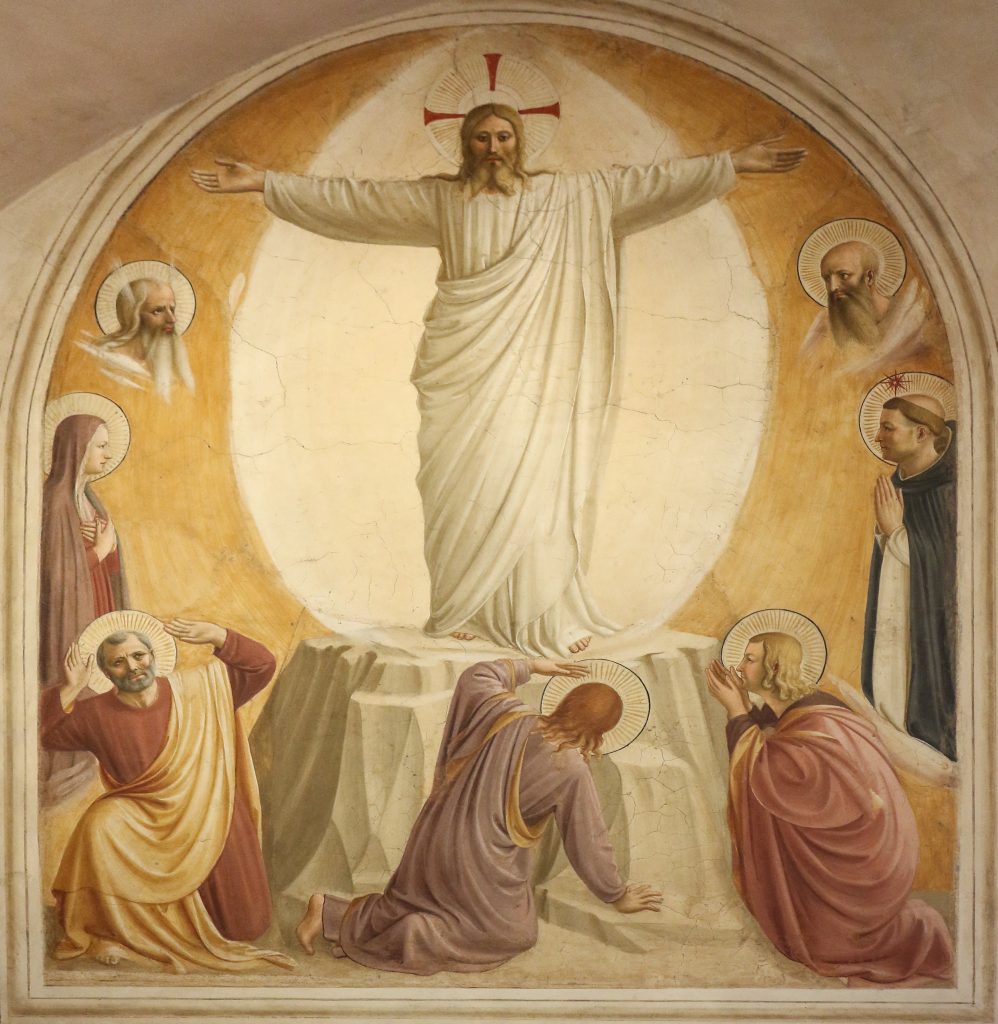
Fresco by Fra Angelico in the
Dominican convent of San Marco, Florence
From my point of view this subject is extremely timely in our rushing world. Though in reality it is not that time has speeded up, but that there is a ‘traffic jam’ among our tasks. We create more and more – often unnecessary – things to be done for ourselves, and these produce restlessness. We get through more and more, but in vain, since the results do not bring satisfaction. We do not find peace, calmness and happiness. We are in a hurry and rushing, and eventually we are never really in the present. We focus always only on the next task instead of on the current one. We always think the next job is more important than the one we are doing at the moment, whereas we should be present there where we are just now, among the people around us. Time is given to us to bless, not to want to overcome it. We have no need to fight against time. The quality of the usage of the time given is more important than to have more and more of it. Do we use time for praising God or do we fight it?
Are we able to accept the will of our Father in Heaven? He gave us time so we can return to him, so we can confess: yes, you are the Almighty God, whom we have to thank for everything. We ought to use time well, even if it seems we have plenty of it. We may look at the Virgin Mary’s example, who answered yes from time to time to the will of God as if it was the last moment of her life. She searched only for love. She led a normal, everyday life. She looked after her small family with pleasure. Mary did not have to do with things that were useless from salvation’s point of view. We should learn this attitude from her, and then our lives can be changed. Then nobody would ask why Christians don’t radiate joy. We would radiate the fact that we have been saved, and set free. Then seeing our joy at salvation many would join us.
If we could realize the wonder of God’s providence, then we would express our joy unrestrainedly. But unfortunately our time is taken up by advertisements, by watching TV, by lottery winners. As long as we can’t stop these useless pastimes and create silence around us and inside ourselves, then we will not hear the voice of God.
Sometimes absolutely useless things offer themselves beautifully disguised so as to deceive us. Each time we must make a choice. Our best guide for making decisions is: do what is less easy and more difficult. Do not choose the immediate solution as that is the one that always originates from selfishness. For instance: on weekdays it may seem more holy to go to church than to iron the clothes. But really it would just be easier for us if we dodged the ironing. (If we haven’t made a good timetable for ourselves, then at least we need to choose priorities properly.)
We live in time, in other words we are given free will and very many opportunities: there is always a new chance to make a good decision. We must divide our time well! We need to find a place in our daily schedule for prayer, for reading and for Mass. Looking after our relationship with God is not a waste of time. It can bring real peace and inner calm; it gives strength for the following day. We need to give time to it; it is an investment that will bring us benefits.
Life is like a game of cards. When we play, we collect cards following certain rules and the suits. The winner is the one who manages to follow suit successfully. But the winner does not keep the cards, he only uses them, and then returns them to the dealer. Sooner or later everyone can win who joins the game and keeps the rules.
God wrote “card suits” into our souls, making us know what is good and beautiful. And alongside this He created a huge desire in our soul, a space for goodness and beauty, that can be lastingly filled only by Him.
We can try to fulfil our desires through different good and beautiful things: good relationships with people, clothes of the latest fashion, fast cars, exciting TV films, exotic food, but all of these will make us happy only for a short time. An empty space always remains in the soul. We can use these things, but we should not wish at all costs to own them, because they are unable to bring real joy.
The person who wants to own the cards will be disappointed, because the prize is not that. The things of this world are only tools, the ‘prize’ is God himself. When we play cards, we do not own them, we just use them. Afterwards they are returned and others may use them. Our longing can only be satisfied by God, which is why He created inside us the desire.
Saint Paul says: ‘I tell you, brothers, the time is running out. From now on, let those having wives act as not having them, those weeping as not weeping, those rejoicing as not rejoicing, those buying as not owning, those using the world as not using it fully. For the world in its present form is passing away.’ (1Cor7,29-31) Material things of this world are required for life, but we need to remain free of them. Not because they are bad, but because they are not everlasting. All the beautiful and good things in the world are a reflection of God, but a hazy one, and cannot be compared to the joy that awaits us.
I would like to share my thoughts with you. My patron saint in the Order is the Queen of the Rosary. I love her and I love the Rosary prayer. The second topicality of my writing now is the year of the Rosary. The Luminous Mysteries have brought me great rejoicing. They fill the gap that I have felt for a long time, as the traditional mysteries of the Rosary mention only the childhood, suffering and glory of Jesus. Between his birth and death there is Jesus’ adulthood, his public life and the foundation of the Eucharist that were not emphasized in the rosary till present, and now can be the source of new energy for prayer.
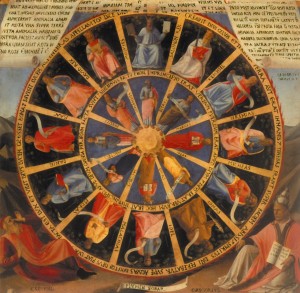
I have been hesitating for months how to summarize my thoughts. There are an incredible number of points of view from which to speak about prayer, so immediately at the beginning I abandoned any attempt at completeness. The subject is inexhaustible. I shall try to pass on what I have experienced. I want to tell you what brings me closer to God. I have organized my thoughts along certain lines. I would like to emphasize that this is only one direction among many. I imagine God as being at the centre of a circle, and we set out in his direction from the circumference. Each path makes a radius starting from the outside towards the inside. But if we move only along the edge of the circle, then we finish back in ourselves, and never find God. This cannot make us happy. Everyone experiences himself what helps him on his way towards God.
I would like to write about modern people’s prayer. For example it would be possible to systematize it according to the following standpoints as well:
* Who? – Private prayer and group prayer, led by a priest, ecumenical prayer.
* How? – Praying while doing something else or spending separate time in prayer; silent or sung prayer.
* With whom? – Asking the help of the saints.
* When? – Blessing the day, the breviary according to different religious communities’ traditions, in compliance with parts of the day or with feasts.
* To whom? – Praying to the Father, to the Son or to the Holy Spirit.
* What? – The Rosary, litany, private prayer, petition.
* Where? – In church, before the Blessed Sacrament, in the street, at home.
Even so, I shall construct a way of my own. I do not say that only the following ladder of prayer leads to God, but rather that it is one of many narrow mountain paths that all lead to Him who said about himself: ‘I am the way, the truth and the life. Nobody can reach the Father only through me.’ (Jn 14,6)
The third topicality of writing now is the centenary of the Dominicans arrival in Zuglo, in Budapest. The brethren in the white habit returned to Budapest on 27 August, 1903, and built a church dedicated to the Queen of the rosary in neo-gothic style. I was baptized there, I belong there, I live in the neighbourhood of the so-called ‘Domi’ church and am a Lay Dominican.
I offer my ideas not only to Dominicans, but to all those brothers and sisters who love God and seek a path.
I give thanks to the Lord that I could describe in words and translate the gifts that have been given to me by Him. My wish is that it may lead the reader through contemplation to Jesus Christ.
August 2003, Budapest, Hungary
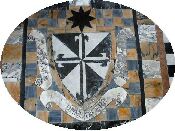
A Prayer Ladder
Steps leading from searching to the fruit of prayer
With the Luminous Mysteries of the Rosary
STEP ONE: Searching
‘I am the way, and the truth and the life.’ (Jn 14,6)
As long as we remain up to our necks in the troubles of this world, only seeing things horizontally, we shall never find our purpose in life. But if we start to search vertically as well, then we have a fair chance of finding God.
When there is a yearning within us, when we are hungry for the truth, when TV series are not enough, when we desire more, then we shall have taken the first step towards God. Searching for the way is the first response to God’s calling. He is always ready to receive us, but He will never force us to sit at his table. We need to knock at his door, then He will open it and invite us in to sit down.
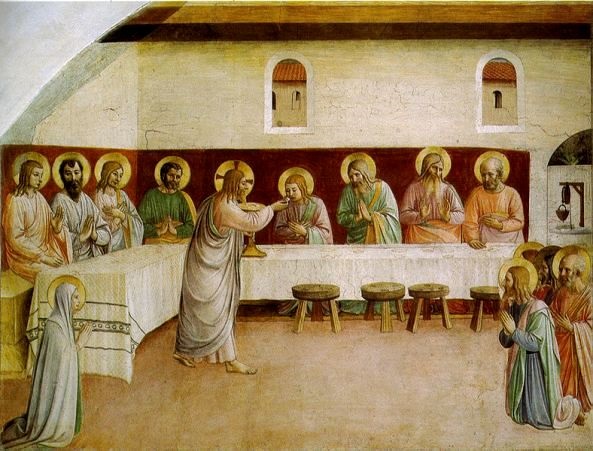
STEP TWO: Asking
’Ask, and it will be given to you; seek, and you will find; knock, and the door will be opened to you.’ (Mt 7,7)
If we have come to realise that the purpose of our life is to do with God, then we will start to pray. The most basic and most common way of doing this is to ask for something. We ask God to help us. First of all we turn to Him when we are in trouble. He enters our mind when we cannot solve our problems. This step is a natural stage in the development of prayer, but we need to move on. If we stop there and stay on this step, then our relationship with God will become infantile, selfish and one-sided. There is the risk that God will become a machine: we drop in a ‘prayer bit’ and a ‘help bit’ is given in exchange. When it is not given, we will be disappointed and raise objections asking why God let this happen, etc. This is not how prayer works. We need to seek and accept His will, and try to cooperate with Him.
Certainly we can tell God our wishes, as Jesus said: ‘Again I say to you, if two of you agree on earth about anything for which they are to pray, it shall be granted to them by my heavenly Father. For where two or three are gathered together in my name, there am I in the midst of them.’ (Mt 18,19-20) But our wishes should be in harmony with His will and we must accept it if they are fulfilled not in the way we imagined would be good for us. The God of Providence surely knows better than we do what is necessary for salvation. Anything we ask for the sake of this purpose will be granted. If after a time we can leave this step, and abandon asking just for ourselves, then we shall have moved nearer to our goal.

STEP THREE: Repenting
’No one has greater love than this, to lay down one’s life for one’s friends.’ (Jn 15,13)
When we have begun frequently to ask help from the Lord, and our relationship with Him has begun to develop, He then shows us our sinfulness. Our response, the admission of our sins and our weaknesses, is when we move on to the third step.
This is a big jump, but we must not be afraid, for Jesus takes us by the hand. As we discover our deficiencies, irregularities, and selfishness in more and more areas, we start to feel ever more the distance between ourselves and God. At this point we must not be afraid. This distance is a reality, but it does not prevent us from approaching God. The purpose of this step is to crystallize within ourselves who God is and who we are. While we were living our lives without Him our selfishness resulted in us unintentionally making ourselves our own god.

Through penitence we come to recognize God’s mercy. He forgives us everything for which we ask His forgiveness. Sin takes us away from God, but sins repented bring us near to him. Frequent confession helps us greatly along the road towards God. As it purifies our soul our perception becomes clearer. We hear more easily the voice of the Holy Spirit. Next to our smallness we see the Lord’s greatness and generosity in that He gave his own son for us. Jesus Christ is the bridge between ourselves and Him. If we can accept Him as our personal saviour and stand beneath his cross and give Him our sins, then He will liberate us. Looking at his cross makes us see the world differently. We know that the road from the cross leads to the empty tomb and the resurrection. Jesus travelled this journey both for our sakes, and in our stead. He wanted to die for us rather than lose us. He loves us so much that He gave his life for us and He will raise us up from death to eternal happiness.
Penitence purifies us. Our soul is reborn. It is important that we should make a distinction between the sin and the sinner, both in ourselves and in others. We condemn sin, but must be kind to sinners. The closer the sinner is to ourselves, the more difficult this is; indeed the hardest thing is to forgive ourselves. But if we don’t do so, we are making ourselves more important than God, who has already forgiven us. And we are unable to?
If we learn to accept ourselves – often after a difficult inner struggle – we will find God’s peace in our soul.
STEP FOUR: Giving Thanks
’Thanks be to God for his indescribable gift!’ (2 Cor 9,15)
When the soul is calm, we can move on to the next step: thanksgiving. Thanks comes from inner peace and rejoicing, from an outburst of love. There’s a song: ‘Peace, joy and thanksgiving are singing in my heart, I praise Jesus.’ This song is all about the happy rejoicing of a grateful heart.
At first we find we only give thanks for the good things received, while our troubles still make us worry all the time. But if we listen to Jesus, when he says: ’Do not let your hearts be troubled’ (Jn 14,1) and consider our lives afresh, then gradually we will come to give thanks for trials as well.
Because each stumbling block is there to be overcome and to help strengthen the soul. We are in God’s hands. Nothing can harm us. Saint Paul writes: ’For to me life is Christ, and death is gain.’ (Phil 1,21)
The more the tasks given by God, the greater is the love that he reveals.
Let us give thanks for our whole life!
STEP FIVE: Giving Praise
Glory be to the Father, and to the Son and to the Holy Spirit. As it was in the beginning, is now and ever shall be, world without end. Amen.
The heart full of thanks moves on to the praising step. Not the gifts we have received from God, but God himself is now the occasion for our prayer. The inner urge to praise God just because He is God, so that nothing else matters anymore – this is what we mean by praising: to praise God for Himself.
For He is so mighty. He is everything in all and we are nobody, existing only in him. In life we have just one task: to praise God. This is the purpose and meaning of our lives. By this we mean not only prayer, but that prayer should affect our deeds, and that we should try to make all our actions become the praise of God.
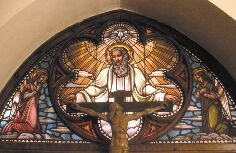
Of course this cannot happen automatically. We need to train ourselves systematically. We must not come to a halt en route, even if we fall over. We need to look for the hand of Jesus, stand up and to go on further together with him.
We need to begin a new every day and try continually to praise God with all our heart. If remorse gets in the way, we should return to the penitence step, move on to thanksgiving, and then again we shall be able to praise the Lord. The fund of praise is inexhaustible, both when using formal texts, or praying freely. This abundance is itself a wonder that serves both to please God and to lift up the soul.
STEP SIX: Reading
’He came to Nazareth, where he had grown up, and went according to his custom into the synagogue on the sabbath day. He stood up to read…’ (Lk 4,16)
As we lift up our souls ever closer to God, the greater is our desire to know him. We can learn much from the Bible, especially the New Testament.
It is very useful to read through the daily readings of the Holy Mass. Praying the divine office regularly can also answer much of our questioning. The Bible readings it contains are an inexhaustible source. We are given a new understanding each time we read them. It is always worth reading them slowly, and not just taking a quick look. We often unintentionally hurry reading when the text is not new to us, but this is not helpful. It is good to pause for a while at the end of a paragraph or a psalm.
If we are able to read the same text in different languages, then we will experience a wonderful abundance. Each of the world’s languages has different expressions. Not only the words are different, but words and sentences are linked in various ways. Perhaps a concept or a mystery can only be completely conveyed by using all the languages together.
It is worth reading from different editions in our own language as well. Comparing different wordings can help us learn more about God. Let us take, for instance, one of the readings for the current Sunday. We read two different versions in our own tongue and then one in another language. We begin to feel that the text is much richer than we had ever thought. Our souls will be lifted up by this abundance and we will have a greater understanding.
STEP SEVEN: Meditating
‘He will pour forth his words of wisdom and in prayer give thanks to the Lord, who will direct his knowledge and his council, as he meditates upon his mysteries.’ (Sir 39,6-7)
Reading is followed by meditation. This means to think deeply in ourselves about what we have read, to ‘chew over’ the words. This step, like the reading step, always has in mind a concrete subject matter. For example it is not enough just to read a psalm, we need to think it over, to meditate on it. We need to read commentaries to help us understand it better. We need to keep it in mind, to ask God’s mercy, who will help our understanding. New thoughts will come to our minds, and we will better understand God’s mysteries. A regular time must be put aside for doing this, otherwise it will not be of use. (This method of prayer is especially necessary for Dominicans, since study is located at the centre of our spiritual life.) As adults we cannot let our spiritual life remain at the level of childhood. We must never be satisfied with our present knowledge. For this it is practical to find a fixed time in our daily schedule. Even if we can find only a short time, but regularly, then we will make good progress. Certainly will-power is needed to persist. It is worth making a note of any questions, which we can later ask our spiritual leader or fellow lay members to answer. It is also useful to immediately note down any good ideas we may have. These can be shared with others, or we can think further about them. Frequently after finishing a reading we have thoughts that can help us much in understanding the mysteries of faith. Thus on our ladder leading to God meditation is the step of our mind, our brain. We must learn to concentrate on our subject matter. It is worthwhile!
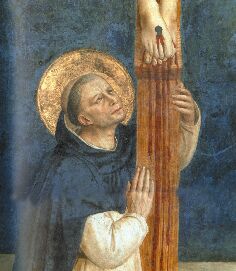
To try and imagine ourselves taking part in the story is often an aid to meditation. We imagine we are the participant, or nearby. For instance we are standing beneath the cross like St John. What are our thoughts, our experiences in this situation? What were the feelings of St John? This way, we reconstruct the written story as living reality, and come closer to understanding it.
An ice-cream and God
Anything that happens, anything we see or hear in the street, can make us meditate. Even an ice-cream.
You buy two scoops of vanilla ice-cream. It is delicious. It is enjoyable cool and creamy. You walk and your thoughts are far away. Even some ice-cream can bring us closer to God. You fall into meditating. In this hot weather you are enjoying the ice-cream as much as the new wine given by Jesus was enjoyed by those present at the wedding at Cana. You begin to think with a glad and thankful heart of the people who helped make this ice-cream. Thanks be to God that we can have treats like this.
Lord, bless those who made and sold it in the shop. Bless those who tended and fed the animals whose milk was used for the cream. Bless those who grew the sugar-beet and those who produced the sugar for sweetening the cream. Bless those who sowed and harvested the wheat, those who ground it, and those who made the cone from the flour.
I give thanks to you, Lord, for all of these people’s work and for their life, family and neighbourhood. Grant them faith, hope and love.
Grant that they may hear and respond to your summoning voice, thus attaining salvation. Let none be lost. Amen.
STEP EIGHT: the Rosary
’And Mary kept all these things, reflecting on them in her heart.’ (Lk 2,19)
We need to become like children with open hearts, listening and praying. We must leave behind the soulless world of our consumer society! Time is given to us for our conversion, and that only. We must not waste it! Even so, we rashly think only about security and money matters. We have not the courage to put our trust in a caring Father in Heaven. We don’t entrust him with small matters, and the big things are not ingredients of our daily lives. Human life consists of small links in a chain, like the rosary.
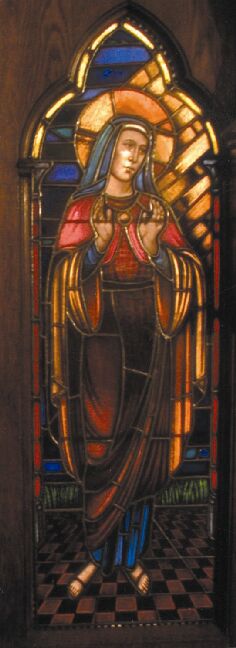
The rosary is a good path to contemplation, but it will not bear fruit if we only pray it mechanically. My own way of praying the rosary is as follows.
I say the name of the particular mystery before each decade, and think of the relevant part of the Bible, or read it. Then I remain silent for a short time in order to think about the mystery.
After this comes the Our Father, taught to us by Jesus himself, who prays it along with us. That is why I don’t want to pray it mechanically out of habit, but to live and understand what I say. There’s no need to hurry. More important than the quantity of prayer is its quality.
In each Hail Mary, following the Hungarian tradition, I say the name of the mystery after the name Jesus, thus repeatedly directing my attention to a moment in the life of Jesus and Mary.
Then follows the opportunity to praise the Holy Trinity in the ’Glory be…’, of all short prayers the most concise and well formulated. I end the decade with the Fatima prayer: ‘O my Jesus, forgive us our sins, save us from the fires of hell…’
While I am saying these prayers I keep my attention focussed on the given mystery for each decade, thus praying verbally and meditating at the same time. My aim in fact is to arrive at contemplation (gazing on God) like the Virgin Mary did – as we read in St Luke’s Gospel. For this I need these ways of prayer, and even more the maternal support of the Virgin Mary.
The Luminous Mysteries
The 1st luminous mystery: The Baptism of Our Lord in the River Jordan
’This is my beloved Son, with whom I am well pleased.’ (Mt 3.13-17)
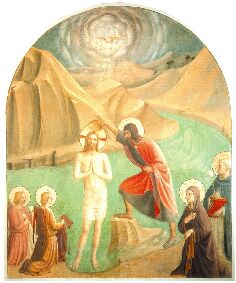
Jesus shouldered our sins for us ‘He made himself as sin for our sakes’. He was baptised on behalf of sinners.
I will take part in this story. I will sit down on the bank of the Jordan and examine my conscience. I will watch what the other penitents do and how they step into the water. I will look at Jesus and then follow him. I will experience his baptism together with him.
Jesus went under the water and as He came up, suddenly the sky opened.
He was so humble that it touched the Father and He showed his love towards his Son in front of the people. Our life also comes from the love within the Holy Trinity. Our Lord set us an example of love when He, the innocent one asked for baptism as a sinner from John. He suffered together with the people in compassion for the pain resulting from sin and this made him go and stand among sinners and conciliate the Father.
He learnt obedience from suffering and the Holy Spirit came down onto him. The Holy Spirit filled him and gave him the power to be able to fulfil his mission. All of this happened at the beginning of his public life. God was moved by his Son’s humility. He, Jesus Christ, is entirely both God and human being.
The 2nd luminous mystery: The Wedding at Cana, when Christ manifested himself (Jn 2.1-12)
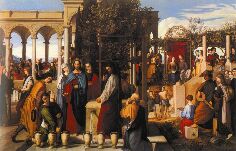
The Wedding at Cana
Jesus was a real man, living flesh and body, who went out to celebrate with his friends. At the same time He was God as well, as we can see from his changing the water into wine. This was the first divine sign (miracle) in Jesus’ life, by which He wished to make people glad.
In ourselves we too can attend the wedding at Cana. We might be the servant to whom Jesus speaks, or any other participant in the story. We can live it through and think out the story in detail, how it might have happened. We can watch the Virgin Mary. We can be happy along with the wedding guests and taste the new wine.
How full of love He must have been if He thought it was so important not to leave abandoned the host who ran out of wine. In this way the host was not embarrassed in front of his guests. Even more striking is how Jesus did not let down those who trusted in him. Jesus did not go there with the purpose of drawing others’ attention to himself by doing unusual things. Far from it. But when they believed he could help them, he did. His mother interceded for the new couple who had no other resources left. Trust and faith were the soil from which came the miracle.
Jesus helps us now as well, if we have the courage to ask for his support in situations that look hopeless. Often he does not assist us in the way we expected, but we can always put our trust in him.
The 3rd luminous mystery: The Proclamation of the Kingdom
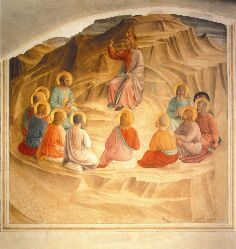
‘This is the time of fulfilment. The kingdom of God is at hand. Repent, and believe in the gospel.’ So spoke Jesus in Galilee before he called his disciples. This happened soon after his baptism and temptation.
What courage! But now, looking at it from the 3rd millennium, it no longer seems so. We are bored with the stories of the Gospel, we know them. Or so we think. Let us return to that time and be there with Jesus. We must not look bored! How much courage He must have had to stand in front of the people and proclaim that the kingdom of God had been brought to mankind by himself.
Let us follow Jesus! Let us listen to him! Let us read how He spoke to people, what He said about the kingdom of God. Let us watch him! We can ask the questions and listen to his answers! We can repent and become his disciples.
In penitence we are given new opportunities through Christ’s redemption. He has brought light to the world and gives it freely. It has no price that we can buy it for. We can not pay for it. We can only receive the kingdom of God humbly into our hearts purified by repentance. A gift indeed.
The 4th luminous mystery: The Transfiguration of Our Lord
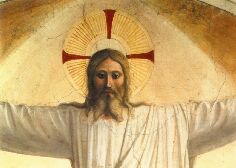
We read in the prayer of the prophet Habakkuk: ’God comes from Teman, the Holy One from Mount Paran. Covered are the heavens with his glory, and with his praise the earth is filled. His splendour spreads like the light; rays shine forth from beside him, where his power is concealed.’(3.3-4)
In the 20th century St. Faustina wrote the same things as the prophet Habakkuk about the merciful Jesus.
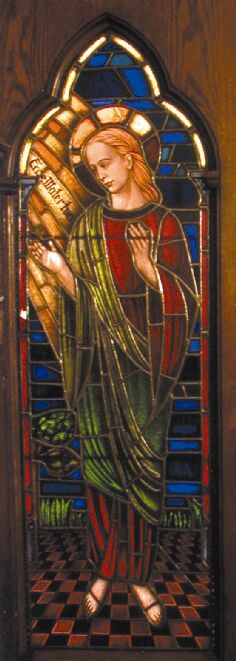
God is unchanged in his glory in the Old Testament, in the New Testament and in the 20th century as well. All of these descriptions try to convey the truly perfect glory – not totally describable in human language – that characterises only God, and which we will encounter after our death. This is our happiness: one day we shall see Him face to face. With the feast of the Transfiguration we remember how Jesus showed his glory to his disciples on mount Tabor. This feast is celebrated in the church on 6th August, the day Saint Dominic died.
Let us go up the mountain together with Jesus, Peter and John. We can ask Saint Dominic to join us. We can sit down, be silent, and think about what Jesus looked like when they saw him.
At first the disciples were disturbed. Perhaps we also are shocked and frightened, because for human beings God’s glory cannot be imagined, and we were not prepared for this encounter. Soon it is understood that this is reality: what they are seeing now is how Jesus truly looks. Before this moment no one knew. From the beginning He was this same person, but He emptied himself so as to be one of us. He desires to win our friendship by faith, not by touch. Only a few are allowed to see his glory and they hear the same words from the Father in heaven as at the river Jordan: ‘Whilehe was still speaking, behold, a bright cloud cast a shadow over them, then from the cloud came a voice that said, “This is my beloved Son, with whom I am well pleased’ to which was added ‘Listen to him!’ (Mt 17.5)
Confusion is replaced by fear. They fall down. We are there with them. There is silence. Later on we shall give thanks to God for the experience, but now only Jesus is present. He, our friend – who earlier has had a quite natural conversation with Moses and Elijah – now addresses us in a calming tone: ’Rise, and do not be afraid.’ (Mt 17.7) After the transfiguration Jesus mentions his resurrection for the first time. He tells them not to speak of this vision until he has resurrected, since showing them was done not for popular acclaim, but to share the glory of the risen body with his friends through an excess of love.
He was able to show his risen form before his death because time is not a limitation for the Son of God. He rules time. He is eternal. His transfiguration points beyond our earthly life. There is no past, present and future in eternity, where only God exists and we in him. His is the whole of history and everything that lies beyond. History takes place in time. But it is only us who need time in order to make sense of events. He sees all of history at once, with no need of time. That is his perfection. Perfection is a dimension not possible for humanity to grasp. We can approach it only via analogy.
Therefore, when we say that God knew in advance what we would do in the next five minutes, that does not mean He had decided it in advance instead of us. No. He gave us free will and we make decisions of our own. But because He sees the whole, He knows what will happen next.
Here is a comparison. An ant can crawl on the floor, on the wall and even on the ceiling. I’m sure it makes no difference to it, as an ant is not aware of the three dimensions, only of flat surfaces. It knows only ‘left’, ‘right’ ‘forward’ and ‘back’. ‘Up’ and ‘down’ have no meaning for ants. But that does not prove the world is flat. We see the ant moving in three dimensions even though it does not know that.
God sees time whole.
We live and think in three dimensions and in time. We feel quite certain what ‘up’ and ‘down’ mean in our small world, yet these directions are relative, because the Earth rotates. And time? Time exists only in our life on Earth.
The angels were also given free will, but minus time. They could all decide for or against God, but only once, as time does not exist in their life. For this reason the result of their decision is irrevocable and eternal.
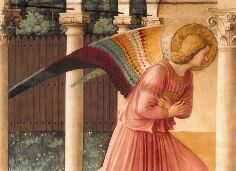
Let us value time, it is in our favour. We can choose God repeatedly!
The reason Jesus tells the ones who witnessed his transfiguration not to speak about it until after his resurrection is because He knows that it will always remain in their memories, strong and ineradicable. A vision is a fragment of eternity, and as such outside time. All visions are thus unforgettable, remaining more vivid in the human memory than any experiences stemming from this world. Neither the disciples, nor the saints ever forgot their visions, which instead stayed always alive in their hearts. Their lives were changed by them, as for example was the Virgin Mary’s life by her meeting with the Angel.
Let us rejoice with them. By this vision we shall be strengthened in our faith as they were.
The 5th luminous mystery: The Last Supper, when Our Lord gave us the Holy Eucharist
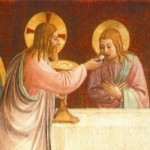
This mystery has an important connection with the liturgy of Holy Week, especially with Holy Thursday – the feast of the foundation of the Eucharist – and with the first glorious mystery of the rosary: ‘Jesus, who rose from the dead.’
We were accepted into the Church through baptism. Jesus is our king, who liberated us from eternal death. He welcomed us as his brothers and sisters and entrusted his mother under the cross to take care of us.
He sits us at his table and feeds us in the Eucharist with his own body and blood. Where’s our gladness? Why aren’t we happy?
Often we participate at Mass feeling bored and unattentive instead of enjoying the opportunities of being God’s child. Meanwhile our time is passing. Let us shake ourselves up! Let’s wake up! Let us eject inappropriate things from our hearts so we can receive the gifts of God. Then He can fill us up and we will radiate love.
Holy Thursday predicates Easter. The Last Supper could not have happened if our Lord had not given his life on the cross for us afterwards. If He had felt ashamed of us, being sinners, then He would not have taken us on. But He loved us so much that He did it, and at the Last Supper even took care beforehand to leave us his presence as a source of strength.
While Holy Week is filled with suffering and sadness, the Last Supper illuminates it before Jesus is arrested. The resurrection can be understood only in the light of the Eucharist and the Eucharist can be understood in the light of the resurrection. The vulnerability of a loving God is shown in the breaking of the bread. Does God surrender himself to us in a morsel of food? Does He put himself entirely at our disposal? Yes, He does.
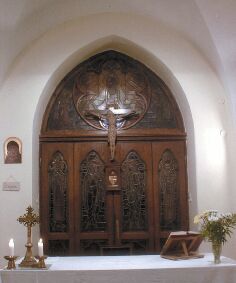
inside view of the oratory
The body that hangs on the cross, that dies and rises again, is the same as the one he gives us in the bread. He has resurrected, He is alive and among us. His presence is real. Are we alive with him? Do we take the opportunity? He is with us and on our side. Gently but firmly He calls to all of us: ’Put your finger here and see my hands, and bring your hand and put it into my side, and do not be unbelieving, but believe.’ (Jn 20.27)
He did not abandon us when He died, but since then has actually remained present in the tangible reality of the Eucharist, where he is available to every believer on the surface of the globe. ’I have told you this so that you might have peace in me. In the world you will have trouble, but take courage, I have conquered the world.’ (Jn 16.33) As Jesus says this He feeds us with his own body as we journey towards him, and the hope that He radiates: ’I am the bread of life. Your ancestors ate the manna in the desert, but they died; this is the bread that comes down from heaven so that one may eat it and not die. I am the living bread that came down from heaven; whoever eats this bread will live forever; and the bread that I will give is my flesh for the life of the world.’ (Jn 6.48-51)
STEP NINE: Contemplating
‘Contemplari et contemplata aliis tradere.’
‘Handing on to others the fruit of our contemplation.’
This motto of the Dominican Order stems from Saint Thomas Aquinas, Doctor of the Church.
I can move on from meditation to the level of contemplation. Often these two ways of prayer are not differentiated clearly, but they are essentially different.
Contemplation is a gift of God, but we cannot wait inactively. We need to prepare ourselves to become able to contemplate. The soul can best be united with God in contemplation. All of us can learn the contemplative attitude. The hardest thing is to write about this way of prayer. What contemplation is can only be understood when it is experienced. Here is a concrete example.
We begin with meditation. There is the reading of the day from the Bible in front of us. After having read it thoroughly and meditated over it, we keep quiet and close the book. But not speaking is not enough, silence doesn’t mean just outer stillness – it is useful if it is there, but not essential.
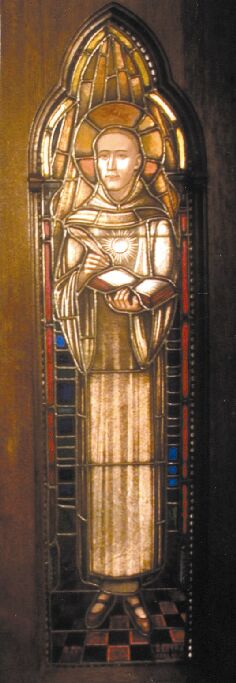
The source of contemplation is inner silence and listening. Contemplation differs from every other way of prayer in that we keep silence in our very insides. We turn down the voice of our thoughts. We want neither to remember the parts of the text, nor to recall our thoughts to mind. We empty our minds and try to concentrate just on one thing: to be present before God. We look at him in our souls. We allow ourselves to be affected by a short extract from the text, but without trying to think about it. We are trying this way to look at God. A word or an expression may be enough. For instance: ‘Jesus’ or ‘Jesus loves me’ or ‘God is love’. Then we move our attention from the word, from the particular concept, we are just watching Jesus and we recognize that He is looking at us. We do not speak to him, but we open our hearts to listen to him. He is so gentle that He never approaches us noisily. We can hear his voice only if we open our souls and prepare a place there for him in our inner silence. His voice is clear, firm and gentle. As long as many noisy thoughts are milling in our minds, we shall not be able to hear Jesus’ voice.
But if we once hear him and feel his presence, from then on we will desire him more and more. This inner meeting makes us live and fills us with joy. It is a mystical God-experience that requires no special abilities. It is a meeting available for everyone. God is always there for us in a very simple way, it is just that we are not there for him. The meeting will happen if I open myself and put aside everything else. I need to keep silent in my innermost part in order to be able to hear Jesus’ quiet voice.
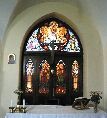
in Budapest, inside view
of the oratory
Body position can also express our readiness for the meeting, though it is not absolutely necessary. We can stand, kneel or bend forward to the floor, and if this is impossible – for example because of illness – then we can sit or lie in bed. The appropriate position helps us to keep our attention on prayer. If we arrive at God’s presence through contemplation, then our bodies become quiet, calm down and our surroundings almost disappear. So, if we keep still and seek Jesus in the above outlined way, then we don’t feel that kneeling or sitting for a long time in the same position is uncomfortable. We stay motionless not by trying to, but because God’s presence is stronger than our contact with our surroundings. If we still need to concentrate on controlling our bodies and our mind is continuously thinking, then we have not yet moved onto the step of contemplation. I need to give myself over entirely, and then I will receive God’s gift.
The first fruits of contemplation are the nourishing inner spiritual peace and happiness stemming from the encounter. Very often it is difficult to find words to describe it. Additional gifts may be some new insight, idea, or task – and knowing that all of them do not come from myself. They are all positive and to do with God.
In other words in meditation we try to produce a new thought (from both our minds and our hearts), but in contemplation we prepare a place to be able to receive something.
Meditation and contemplation belong together, but they are quite different from each other.
STEP TEN: the Holy Mass, the summit of prayer
Moving up the above described steps, we finally reach the top: our most intimate encounter with Jesus in the Holy Eucharist. Jesus, being truly present in the Eucharist, awaits us. He is there for us. He has done everything to redeem us – now finally we just have to go to him. He calls to us, and is always ready to give himself completely to us, to miserable sinners. Furthermore he regards us as a friend, respecting our wishes regarding when we want to go to him. He never imposes himself. We are free to choose him, who gave his life for his friends.
We must come to realize that He is alive in the small piece of bread and the cup of wine, where He is present body and soul.
We should not receive Communion just out of habit. Each time we should remind ourselves that we are meeting our best and most selfless friend, himself the living God. We should make every effort to receive Communion every day.
Passages from POPE JOHN PAUL II’s ENCYCLICAL LETTER
’ECCLESIA DE EUCHARISTIA’ published on Holy Thursday, 17 April, 2003
* ”The sacramental re-presentation of Christ’s sacrifice, crowned by the resurrection, in the Mass involves a most special presence.” (15)
* ”Through our communion in his body and blood, Christ also grants us his Spirit. Saint Ephrem writes: “He called the bread his living body and he filled it with himself and his Spirit… He, who eats it with faith, eats Fire and Spirit… Take and eat this, all of you, and eat with it the Holy Spirit”. (17)
* ”Incorporation into Christ, which is brought about by Baptism, is constantly renewed and consolidated by sharing in the Eucharistic Sacrifice, especially by that full sharing which takes place in sacramental communion. We can say not only that each of us receives Christ, but also that Christ receives each of us. He enters into friendship with us: “You are my friends” (Jn 15:14). Indeed, it is because of him that we have life: “He who eats me will live because of me” (Jn 6:57). Eucharistic communion brings about in a sublime way the mutual “abiding” of Christ and each of his followers: “Abide in me, and I in you” (Jn 15:4).
By its union with Christ, the People of the New Covenant, far from closing in upon itself, becomes a “sacrament” for humanity, a sign and instrument of the salvation achieved by Christ, the light of the world and the salt of the earth (cf. Mt 5:13-16), for the redemption of all. The Church’s mission stands in continuity with the mission of Christ: “As the Father has sent me, even so I send you” (Jn 20:21). From the perpetuation of the sacrifice of the Cross and her communion with the body and blood of Christ in the Eucharist, the Church draws the spiritual power needed to carry out her mission. The Eucharist thus appears as both the source and the summit of all evangelization, since its goal is the communion of mankind with Christ and in him with the Father and the Holy Spirit.” (22)
* ”The Eucharist thus appears as the culmination of all the sacraments in perfecting our communion with God the Father by identification with his only-begotten Son through the working of the Holy Spirit.” (34)
* ”What must Mary have felt as she heard from the mouth of Peter, John, James and the other Apostles the words spoken at the Last Supper: “This is my body which is given for you” (Lk 22:19)? The body given up for us and made present under sacramental signs was the same body which she had conceived in her womb! For Mary, receiving the Eucharist must have somehow meant welcoming once more into her womb that heart which had beat in unison with hers and reliving what she had experienced at the foot of the Cross. ” (56)
* ”Every commitment to holiness, every activity aimed at carrying out the Church’s mission, every work of pastoral planning, must draw the strength it needs from the Eucharistic mystery and in turn be directed to that mystery as its culmination. ” (60)

Movement helps us to strengthen our absorption in prayer. The essence of Saint Dominic’s nine ways of prayer is that the soul and the body are in harmony. Standing up or kneeling down play a role. This is true not only for private prayer, but for the Mass too. It is obvious that we cannot sit with crossed legs and give our attention to the priest as he prays; we try in our soul to participate in what he says. This is expressed in Western Europe by standing, a custom not yet introduced into every Hungarian church. Unfortunately, though, in Western Europe the habit of kneeling at the Eucharistic prayer is disappearing, whereas in Hungary it is still general, which I consider to be important.
The change of the bread and the wine into the body and blood is the world’s greatest miracle. We needn’t wait for another. It is sufficient. Our Lord bestowed his power upon the priesthood, and every day we can be present when his sacrifice is renewed. We must make the effort to attend it both physically and spiritually. Kneeling teaches us to become humble. It reminds us of our smallness and God’s greatness. Kneeling gives us the right approach.
Nowadays we attach too much importance to externals, e.g.: what colour should the front of our mobile phone be, but we forget the important things, like switching the phone off before entering church.
Our participation in the Mass should be important for us. We should think about it in advance. We might decide that this time we will not sit in church just out of habit, but go to attend the last Supper, because Jesus has invited us. Let us try and attend as at a once happening, unrepeatable encounter, since that is what it really is. Each time I receive Holy Communion, it is a personal encounter. All the sections of the Mass prepare us for that. We stand or kneel at the most important parts as the liturgy requires, in order to become physically active participants.
THE FRUIT OF PRAYER: Preaching
‘Lord, have mercy on your people. What are sinners going to do?’ [Koudelka, English edition, document 79]
The concept of preaching:
Usually ‘preaching’ and ‘giving a sermon’ are confused. When in the Mass, after reading the Gospel, the priest comments on the texts from the Bible and teaches the faithful, this is properly called the homily, or sermon – not preaching. (Other languages have a separate word for this as well.)

The Code of Canon Law says:
Can. 767 §1 “The most important form of preaching is the homily, which is part of the liturgy, and is reserved to a priest or deacon. In the course of the liturgical year, the mysteries of faith and the rules of Christian living are to be expounded in the homily from the sacred text.“
[Footnote to Can. 767] Regarding §1 a lay person cannot be permitted to give a homily. Preaching is considered to be a homily by law regarding the current rule: when it has the described content and is given in the requisite section of the Mass – thus not at the end … At a Sunday celebration of the liturgy of the Word taken in the absence of clergy by a lay person, the person in charge may also preach. This is not a homily, strictly speaking, as it is done outside of the Mass.Can. 766 “The laity may be allowed to preach in a church or oratory if in certain circumstances it is necessary, or in particular cases it would be advantageous, according to the provisions of the Episcopal Conference and without prejudice to can. 767.”
[Footnote to Can. 766] Authorization of the laity to preach may take place if the persons concerned are charged with an office that includes such tasks (can. 517 §2) or by a separate authorization. In such cases the lay person speaks not on his own behalf, but participates in the Church’s activity, consequently he needs especially to keep contact with the bishop concerning preaching… A homily is not allowed to be given by the laity, even though the laity may be entrusted with other kinds of preaching.Authentic Interpretations on the 1983 Code
Pontifical Council for the Interpretation of Legislative Texts
The diocesan bishop may not permit a layperson to give a homily (c. 767.1)
Query: Whether the diocesan bishop may issue a dispensation from the provision of c. 767.1, by which the homily is reserved to priests and deacons.
Reply: Negative.
June 20, 1987
Péter Erdo, primate of Hungary, says in his book entitled ’Canon law’, in the chapter ‘Types of preaching’:
‘The homily is reserved for priests and deacons… Other types of preaching, for instance: speeches during spiritual retreats or on public missions – the law requires parish priests to organize such preaching occasions from time to time; and a speech given in the liturgy of the Word on Sunday in the absence of clergy… The lay person who is officially charged with celebrating this kind of liturgy may be permitted to also give a speech on such occasions. In Hungary according to the rules of the Bishops’ Conference it seems that those lay people who are officially charged with taking the service of the liturgy of the Word in the absence of clergy, do not need any extra permission to give a speech of their own making during this liturgy.’
Thus in the case of the lay faithful, when we talk about preaching, we are considering our general priestly vocation that originates from baptism. Preaching means the proclamation of the faith, namely, when someone speaks about God and attests his faith by his deeds. In the case of lay people, when we speak of preaching, we are not referring to a summary or a special oration. Lay people have no wish to take over the role of the clergy in the liturgy.
In the Catechism we read:
‘In liturgical celebrations each person, minister or layman, who has an office to perform, should carry out all and only those parts which pertain to his office by the nature of the rite and the norms of the liturgy.’ (Catechism of the Catholic Church, 1144)
It is possible to preach or to give a speech on a question of faith outside the liturgy at an assembly, in a community, in a fraternity and even in a private discussion. We know of Saint Dominic that many returned to the Catholic Church in the South of France after hearing his preaching. His famous preaching was delivered not during the liturgy, as the people he wanted to speak to were not in church. His debates about faith were conducted in inns, in squares, in public places.
In the Acts of his canonisation we read: ‘Abbot William Peire said that St Dominic
thirsted passionately for the salvation of souls; he was extremely zealous for souls. He was also so enthusiastic as a preacher that by day and by night, in churches, houses, fields, on the road, everywhere, he wanted to preach the word of the Lord and he encouraged the brethren to do the same and not to talk about anything except God.
[Koudelka, English edition, document138, Languedoc Canonisation Process 18]“Before Pilate, Christ proclaims that He “has come into the world, to bear witness to the truth.” (Jn18,37) The Christian is not to “be ashamed then of testifying to our Lord.” (2Tim1,8) In situations that require witness to the faith, the Christian must profess it without equivocation, after the example of St. Paul before his judges. We must keep “a clear conscience toward God and toward men.” (Acts24,16) The duty of Christians to take part in the life of the Church impels them to act as witnesses of the Gospel and of the obligations that flow from it. This witness is a transmission of the faith in words and deeds.” (Catechism of the Catholic Church, 2471- 2472)
Acts by the faithful are themselves preaching, without any words. All of us have the opportunity to do this kind of preaching regardless of where and how we live. We can preach like this at work, at home, through our way of life, without doing special things. Our work can itself be preaching, if it is a testimony to Christian values.
In addition we can take on activities that enrich the Church, e.g.: giving religious instruction, charity work, visiting the sick, singing in the church choir, publishing church newspapers, editing Catholic radio programmes or making web sites. If we do any of these with all our heart for the kingdom of God, then it becomes preaching.
But why should we take on things that are not obligatory? Why should we do more than others?
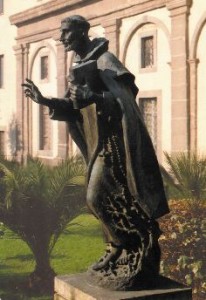
For the reason that it is the fruit of contemplative prayer. At the beginning we pray just for ourselves, then for our family, for our friends. Later our relationship with God entrusts us with an increasing sense of responsibility. We care more and more for the salvation of others. This positive type of caring makes us want to do something. Urged on by the Holy Spirit we must do something for those living around us. (Exactly what, is a different matter for each person.) In Saint Dominic’s words:
‘Lord, have mercy on your people. What are sinners going to do?’ This question urged him on his way preaching. Let us follow him!
The urge is from within, not without. We should only do what comes with self- sacrifice from the heart, given willingly as a gift. Artificial and unwilling actions do not carry a blessing. Preaching is fed by the soul’s experiences in contemplation. Preaching can reach people’s hearts only if prayer is the source of our preaching.
Everyone has different talents for speaking, but the talent is less important than the living relationship with God. A preacher with less talent but who lives a true life of prayer can better proclaim God than a great speaker who does not live what he proclaims. Talking without testimony does not achieve its purpose. We read of Jesus that He spoke with authority. In other words He did not make a speech for the elite, but said what was a part of his real life. Saint Dominic was a true follower of Christ. This is proved by the Acts of his canonisation, in which contemporary people gave evidence of his voluntary poverty, apostolic life style and his continual insistence on the need for study.
“Brother Rudolph said he often heard Brother Dominic preaching and exhorting the brethren to poverty. If ever he or the community was offered any properties, he refused to accept them, nor would he allow the brethren to accept them. He wanted them to have cheap, small houses. He himself wore the cheapest habit and cheap clothes. Asked how he knows this, he replied that he frequently saw him wearing a very cheap habit and a short scapular, nor was he willing to cover it with his cappa, even in the presence of important people.
[Koudelka, English edition, document 156, Bologna Canonisation Process 38]“Brother John of Spain said that Brother Dominic often encouraged and exhorted the friars of the order by word and by his letters to be always studying the New Testament and the Old. He knows this because he heard him talking like this and saw his letters. He also said that he always carried with him the gospel of Matthew and the letters of Paul and he studied them a lot, so that he almost knew them by heart.
[Koudelka, English edition, document168, Bologna Canonisation process 29]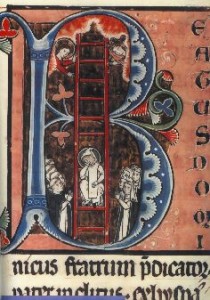
Saint Dominic told his brethren when he was lying on his death-bed not to worry, he would be able to intercede with God for them more after his death than he had been able to in his life. Let us boldly ask St Dominic for help, so that our own lives may become a testimonial preaching for the salvation of souls!
Blessed Fra Angelico (1387-1455)
Originally called Guido di Pietro, he was born in Vicchio, near Florence. He entered the Dominican Order in 1408 after finishing his studies in the art of painting. In the convent of Fiesola he received the name Giovanni. Later he was given the name Fra Angelico (the angelic brother). The frescos by this world-famous artist decorate churches and convents in Italy. His paintings are also on display in museums in Paris and Berlin. Fra Angelico’s immortality is rooted in the holiness of his life. He was not an eccentric, but an apostle who usually prayed before starting his work. He was an artist with a colourful imagination who preached by his brush. His memorial day is 18 February. (After J. Fenyvessy OP: Fra Angelico)
Nihil obstat: Dr. Joseph Pucilowski OP vicarius generalis
Translated by the author from the Hungarian edition
Photo: Istvan Muranyi
Translation revised by Paul Merrick Budapest 2004

